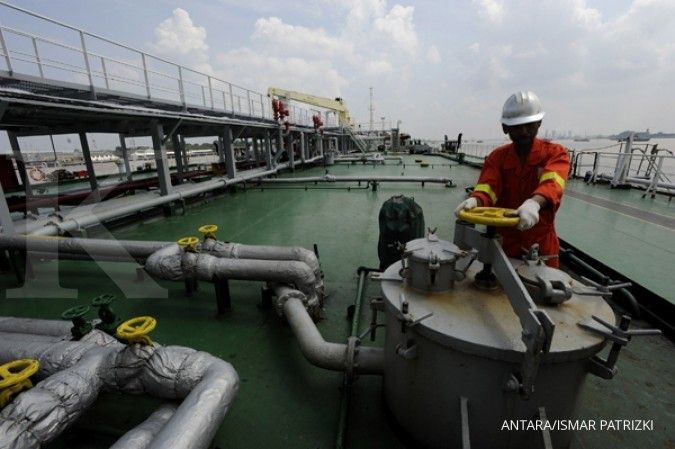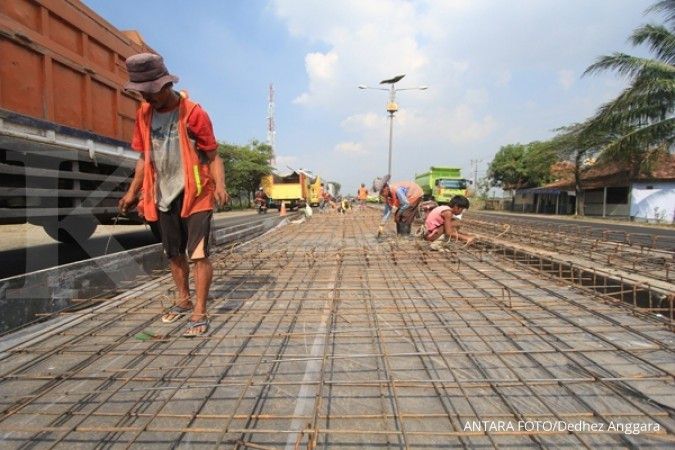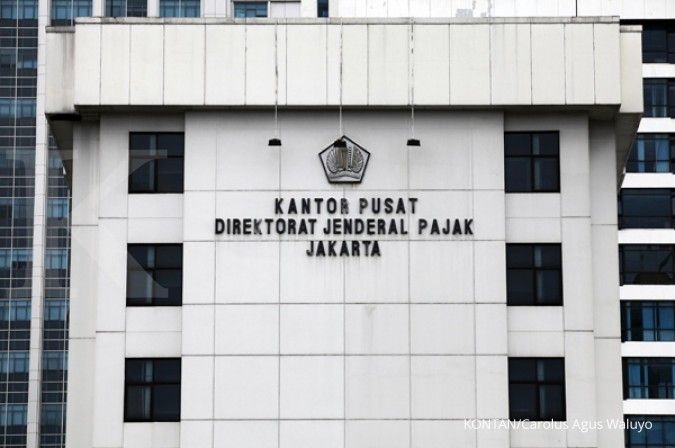JAKARTA. The government’s proposal to double capital spending this year is seen as a positive move that could boost the country’s slacking economy as the global economic outlook remains bleak.
According to the latest revised 2015 state budget, which was put before legislators on Friday for approval, the government was proposing that capital spending on growth-generating infrastructure projects would be more than doubled, from Rp 139 trillion (US$11 billion) last year to Rp 290 trillion this year.
“It will be very helpful [for economic growth]. The additional funding [for capital spending] is significant. And with slowing inflation, economic growth may reach 5.5 percent,” Gadjah Mada University economist Tony Prasetiantono said on Sunday.
The government wants the economy to grow by 5.8 percent this year after growth slowed to the lowest level in five years when it reached 5 percent in the third quarter of last year. The slowdown resulted from weak exports and minimal investment growth. Big economies around the world such as China, Japan and EU countries are struggling to boost growth, which affects their demands and investments overseas.
“If everything goes according to the government’s plan, [economic growth] could rise above [our previous forecasts],” Bank Mandiri economist Andry Asmoro said, in reference to the bank’s 5.3 percent growth prediction for 2015.
In the new budget proposal, both the Public Works and Public Housing Ministry, Transportation Ministry and the Agriculture Ministry will be allocated large sums of government funding. These ministries are key in achieving President Joko “Jokowi” Widodo’s goals of reaching more than 7 percent economic growth, becoming self-sufficient in key crops and building a network of marine highways that connect the archipelago and make domestic products more competitive.
Solving the country’s infrastructure bottlenecks is seen as key to accomplishing these ambitious goals.
However, Andry recalled the country’s classic problem of poor budget disbursement, as the complex Indonesian bureaucracy often stalls various projects and typically forces them to be finalized at the last minute as year-end deadlines approach.
“If the capital spending is bigger but the disbursement of the money does not start at the beginning of the year, we won’t see the impact in the economy [this year],” he added.
A proposed reduction of the fuel subsidies, which were considered burdensome and poorly targeted, from Rp 276 trillion to Rp 81 trillion had enabled fiscal space for more productive spending.
Analysts, however, are cautious that this state budget proposal, which Finance Minister Bambang Brodjonegoro considered “the closest to perfect” that the country has seen in recent memory, might face hurdles at the House of Representatives, which is dominated by opposing parties. Deliberations on the revised budget are expected to conclude in mid-February.
“It [legislative approval of the revised budget] tends not to be a straightforward process,” Nomura analysts Euben Paracuelles and Lavanya Venkateswaran wrote in a report. “We think this is even more the case currently, given President Jokowi’s lack of legislative control and its fragmented nature.” (Raras Cahyafitri)
New budget plan seen as spurring growth
January 12, 2015, 09.52 AM
/2014/08/29/425399071p.jpg)
ILUSTRASI. PT Elnusa Tbk (ELSA) optimistis dapat meraih pertumbuhan kinerja di tahun ini dengan mengandalkan tiga lini bisnis.
Source: The Jakarta Post
| Editor: Hendra Gunawan
Latest News
-
February 07, 2026, 04.59 PM
Indonesian Comedian Summoned by Police Over Netflix Show
-
February 07, 2026, 05.57 AM
GLOBAL MARKETS-Stocks, Bitcoin Rally, Regaining Some Lost Ground with Precious Metals
-
February 06, 2026, 07.58 AM
Indonesian Markets Face More Pressure after Moody's Cuts Outlook
-
February 05, 2026, 07.19 PM
Moody's Cuts Indonesia's Sovereign Rating Outlook to Negative
-
February 05, 2026, 02.43 PM
Indonesia Posts Fastest Economic Growth Rate in Three Years
-
February 04, 2026, 04.38 PM
Indonesia's Tax Revenues Jump in January, Finance Minister Says
-
February 04, 2026, 03.34 PM
AUD 1.6 Trillion Australian Pension Funds Ready to Pour into Indonesia
-
February 04, 2026, 02.13 PM
Indonesian Miners Halt Spot Coal Exports Over Proposal to Cut Output
-
February 04, 2026, 12.39 PM
Emerging Asia Stocks Waver as AI Selloff Bites, Seoul Hits Record High












